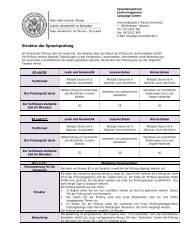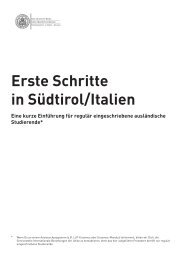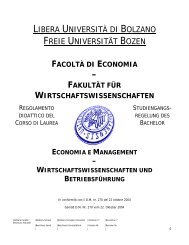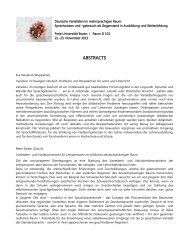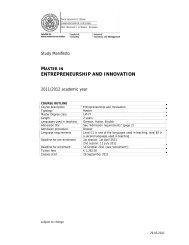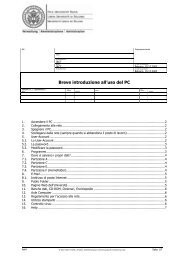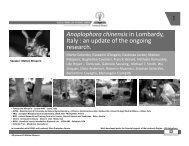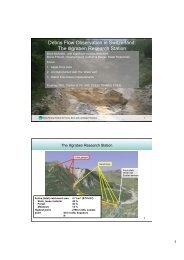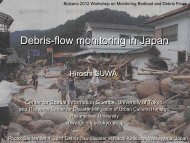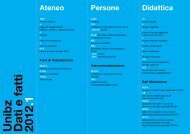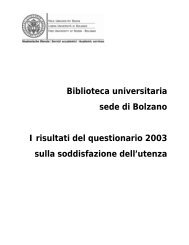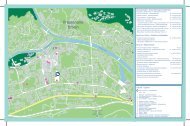Create successful ePaper yourself
Turn your PDF publications into a flip-book with our unique Google optimized e-Paper software.
4<br />
natamente secondo i segni tracciati sul<br />
terreno. Negli altri giorni è uno spiazzo<br />
vuoto.<br />
In questa vicenda mi pare emergano<br />
molte questioni complicate a<br />
proposito del campo possibile <strong>di</strong> azione<br />
<strong>di</strong> tutte le <strong>di</strong>verse parti in gioco, così<br />
come degli effetti delle loro decisioni e<br />
comportamenti.<br />
Con un po’ <strong>di</strong> fantasia – ma molto<br />
meno <strong>di</strong> quanto possa sembrare a prima<br />
vista – viene da pensare che le modalità<br />
messe in atto dai soggetti qui coinvolti<br />
possano essere assimilate alle pratiche<br />
<strong>di</strong> altri soggetti che decidono <strong>di</strong> “occupare<br />
degli spazi”, “lasciare dei segni”,<br />
“innescare dei processi al <strong>di</strong> fuori dai<br />
contesti deputati”, “immaginare forme<br />
transitorie <strong>di</strong> comunità”. Designer e<br />
artisti, per esempio. A volte con il permesso<br />
regolare, ma non sempre.<br />
signs in the city — A little<br />
more than a decade ago, the space<br />
in front of my house, cramped<br />
between the railway lines and a wall<br />
that separates it from an equally<br />
narrow strip of water, was completely<br />
abandoned. A mass of vegetation<br />
covered a semi-<strong>di</strong>lapidated farmstead<br />
that made access to it <strong>di</strong>fficult. At some<br />
point, the area had started to come<br />
alive. To begin with small groups of<br />
a maximum of two or three dared<br />
to penetrate. It was impossible, from<br />
above, to describe the reasons for these<br />
early explorations. After a further short<br />
time a small community decided to<br />
elect the farmstead as its own place<br />
of residence. Their clothes were hung<br />
out during the day; at night probably<br />
because there was no electricity, they<br />
used a fire for light. I know they were<br />
acting illegally and that it would be<br />
a problem for them to stay there. For<br />
sure, this type of buil<strong>di</strong>ng belonged<br />
to someone else. But their ability to<br />
transform a hitherto dead environment<br />
with the signs of everyday life<br />
communicated something a bit more<br />
than an obvious need for a house.<br />
All of this took place in a noncentral,<br />
urban <strong>di</strong>strict that could not<br />
really be described as being in the<br />
outskirts. It was unthinkable that I<br />
was the only one who had noticed<br />
it. Thus every day longer I had these<br />
people as neighbours, I hoped that<br />
the urban authorities were showing<br />
more openness to this unexpected<br />
event compared to what was reported<br />
frequently in the TV news about<br />
evacuations.<br />
I used to leave home early in the<br />
morning, always after having cast a<br />
glance at the farmstead. I was safe in<br />
a real house. Aware of De Certeau’s<br />
thought about tactics and strategy, I<br />
found myself faced with a situation<br />
where all this was taking place and<br />
I could not do anything, apart from<br />
a gesture that only meant something<br />
to me, such as assuring myself that<br />
everything was alright.<br />
In fact for quite some time everything<br />
proceeded smoothly.<br />
One morning I looked out of the<br />
window and saw a group of people<br />
blocked in by various police cars. It<br />
was late and I could not stop to watch<br />
how the situation developed. When I<br />
came back in the evening not only had<br />
the people who lived there and their<br />
clothes on the line <strong>di</strong>sappeared, but<br />
there was no trace of the farmstead,<br />
not even the rubble. The only sign were<br />
two bulldozers stan<strong>di</strong>ng on the clearing<br />
opposite, after having finished their<br />
work. This was not reported on the<br />
local TV news at 7 pm.<br />
In the days, months and years<br />
following the vegetation was<br />
eliminated, the area was tarmacked<br />
over, places were marked out for cars<br />
and lastly toll gates were fixed to pay<br />
parking fees.<br />
Today this space is used every<br />
Saturday for a market that has been<br />
moved from an area where they are<br />
buil<strong>di</strong>ng an underground car park.<br />
The street vendors, armed with valid<br />
permission, arrive early in the morning<br />
and arrange themselves neatly to<br />
comply with the signs marked on the<br />
ground. The rest of the week the space<br />
is empty.<br />
It seems to me that this incident<br />
raises many complex questions<br />
regar<strong>di</strong>ng the likely field of action of<br />
all the various parts in play, such as the<br />
effects of their decisions and behaviour.<br />
With a little imagination, but a lot less<br />
than it would appear at first glance,<br />
we can see that the methods used<br />
by the subjects concerned here can<br />
be compared to the practice of the<br />
other subjects who decide to “occupy<br />
the spaces”, “leave signs”, “to start<br />
procedures beyond the delegated<br />
contexts” and “to imagine transitory<br />
forms of community”. Designers and<br />
artists, for example, who sometimes<br />
have valid permission, but not always.<br />
zeichen in deR stadt — Vor<br />
wenig mehr als zehn Jahren noch war<br />
der kleine Platz vor meinem Haus<br />
verlassen, eingezwängt zwischen Bahngleisen<br />
und einer Mauer, dahinter ein<br />
kleines Rinnsal von einem Bach. Wildes<br />
Gestrüpp versperrte den Zugang zu<br />
einem alten, verfallenen Bauernhaus.<br />
Dann plötzlich: Die ersten Grüppchen.<br />
Zu zweit oder zu dritt wagten sich<br />
Menschen in den Hof. Was sie hierher<br />
zog konnte ich mir beim besten Willen<br />
nicht vorstellen. Etwas später nistete<br />
sich eine kleine Gemeinschaft im<br />
Bauernhof ein. Tagsüber hing vor der<br />
Tür <strong>di</strong>e Wäsche, das Licht musste wohl<br />
vom Feuer kommen, da Elektrizität<br />
nicht vorhanden war. Natürlich hatten<br />
sie das Haus illegal besetzt, es gehörte<br />
mit Sicherheit jemand anderem; dort<br />
leben muss schwierig gewesen sein.<br />
Die Fähigkeit der Bewohner, einen bis<br />
dahin leblosen Kontext mit alltäglichen<br />
Gesten aufzufrischen, bedeutete für<br />
mich mehr als nur <strong>di</strong>e Befrie<strong>di</strong>gung des<br />
Bedürfnisses nach einem Dach über<br />
dem Kopf.<br />
Das Stadtviertel, in dem all <strong>di</strong>es<br />
geschah, lag zwar abseits vom Zen-<br />
trum, gehörte aber noch lange nicht zu<br />
den Außenbezirken. Ich konnte also<br />
kaum als Einzige <strong>di</strong>e Besetzer entdeckt<br />
haben. So lebten wir in Nachbarschaft<br />
dahin, und ich begann zu hoffen,<br />
dass <strong>di</strong>e Stadtverwaltung trotz all der<br />
Räumungsberichte im Regionalfernsehen<br />
etwas offener gegenüber derartig<br />
Unvorhergesehenem sei.<br />
Ich ging stets früh aus dem Haus,<br />
und warf täglich einen kurzen Blick auf<br />
das alte Bauernhaus. Da lebte ich, geborgen<br />
in einem richtigen Haus, bestens<br />
bekannt mit De Certeaus Gedanken zu<br />
Taktik und Strategie und konnte doch<br />
angesichts einer derartigen Situation<br />
nichts anfangen – außer einer Geste, <strong>di</strong>e<br />
höchstens mir selbst etwas bedeutete,<br />
einer Geste, sozusagen, um mich zu vergewissern,<br />
dass alles in Ordnung war.<br />
Tatsächlich gab es eine Zeit lang<br />
keine Zwischenfälle.<br />
Eines Morgens aber blickte ich<br />
aus dem Fenster. Da stand eine Reihe<br />
Menschen, blockiert von Polizeiautos.<br />
Es war spät, und ich konnte nicht weiter<br />
mitverfolgen, wie sich <strong>di</strong>e Situation<br />
entwickelte. Als ich abends zurückkam,<br />
waren nicht nur <strong>di</strong>e Besetzer und ihre<br />
Wäsche verschwunden – das ganze alte<br />
Bauernhaus war wie vom Erdboden<br />
verschluckt. Nicht einmal ein Häuflein<br />
Schutt war übrig geblieben. Einzig und<br />
allein zwei Bagger standen auf dem kleinen<br />
Platz. In der Tagesschau wurde der<br />
Vorfall mit keinem Wort erwähnt.<br />
In den darauf folgenden Tagen, Monaten<br />
und Jahren wurde das letzte<br />
bisschen Grün vernichtet, der Platz<br />
asphaltiert, Linien gezogen und Schranken<br />
für einen Parkplatz montiert.<br />
Jeden Samstag wird hier Markt gehalten,<br />
<strong>di</strong>e Marktleute wurden ihrerseits<br />
aus einer Zone versetzt, in der eine<br />
Tiefgarage gebaut wird. Sie kommen in<br />
den frühen Morgenstunden und bauen<br />
schön geordnet ihre Stände auf. Unter<br />
der Woche ist der Platz leer.<br />
Die Geschichte wirft viele komplizierte<br />
Fragen zum Aktionsspielraum<br />
der verschiedenen Teilnehmer, ihren<br />
Entscheidungen und ihrem Verhalten<br />
auf.<br />
Mit etwas Fantasie – aller<strong>di</strong>ngs<br />
weitaus weniger davon, als man im ersten<br />
Augeblick meinen könnte – möchte<br />
man denken, dass <strong>di</strong>e Methoden der<br />
betroffenen Menschen jenen anderer<br />
Menschen angeglichen werden könnten,<br />
<strong>di</strong>e „Räume besetzen“, „Spuren hinterlassen“,<br />
„Prozesse außerhalb des<br />
gewohnten Kontexts in Gang setzen“,<br />
„vorübergehende Formen der Gemeinschaft<br />
erfinden“. Denen von Designern<br />
und Künstlern zum Beispiel. Die haben<br />
oft – aber auch nicht immer – <strong>di</strong>e nötigen<br />
Genehmigungen.<br />
dafne BoggeRi aPProximatEly inFinitE ><br />
2008 · vErona<br />
5




